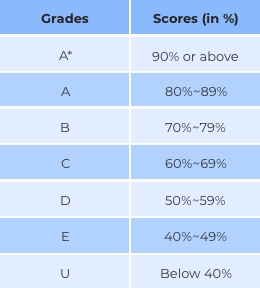UK A-Level has a long-standing history. Prior to 2012, it was also adopted by the Hong Kong Examinations and Assessment Authority to assess student performance, before transitioning to the Hong Kong Diploma of Secondary Education (HKDSE). UK A-Level is known for its higher difficulty compared to GCSE and HKDSE. However, students have more flexibility in choosing subjects, and it is widely recognized worldwide. How are the grades for UK A-Level subjects presented? If one intends to pursue studies in a UK university, should they choose a Foundation course or A-Level? Below, we will introduce the course content of A-Level.

Source: Unsplash
What is UK A-Level?
A-Level, short for General Certificate of Education Advanced Level, is suitable for students who have completed the General Certificate of Secondary Education (GCSE) in the UK. The duration of the program is two years, and its recognition and authority are widely acknowledged worldwide.
Introduction to GCSE and A-Level Systems
The GCSE system requires students to study specified subjects such as English (language and literature), mathematics, and sciences (including physics, chemistry, and biology). Additionally, students must select subjects from the categories of arts, crafts and design, humanities, and modern foreign languages. Although the range of subjects is extensive, the difficulty of the curriculum is relatively low, aiming to consolidate students' academic knowledge. Upon completion of the GCSE program, students with excellent grades can progress to A-Level.
However, the GCSE curriculum varies among different schools. For example, certain schools may not offer options like media, law, or psychology. Students who wish to study these subjects should seek advice from teachers and check if their desired schools provide the corresponding courses, as it may be challenging to pursue the relevant A-Level courses otherwise.

Source: Unsplash
UK A-Level does not have compulsory subjects and offers fewer subjects for study. However, the difficulty level is higher, and the curriculum aims to enhance students' logical thinking, independent learning abilities, and academic proficiency. This prepares them for university studies and future academic and professional careers. The first year of A-Level is known as AS (Advanced Studies), during which students choose four to five subjects to study. The second year, known as A2, delves further into the course content.
Requiring students to select four to five subjects in AS is to ensure they meet the minimum requirements for university applications. They need to submit at least three examination results to apply for universities, allowing flexibility in case students encounter challenges in specific subjects or choose to drop one based on personal interest.
What subjects are available in UK A-Level?
UK A-Level offers a wide range of subject choices, emphasising students' personal interests. It includes categories such as humanities, sciences, languages, and business, breaking free from the restrictions of arts, sciences, and business streams and providing students with more freedom in selecting subjects. The available A-Level subject options include:
- Art and Design
- Biology
- Business Studies
- Chemistry
- Chinese
- Computer Science
- Design and Technology
- Economics
- English
- English Literature
- Geography
- History
- Mathematics
- Further Mathematics
- Music
- Physics
- Physical Education
- Psychology
The above list represents only a portion of the subjects available in UK A-Level. You can search online for a complete list of subjects.

Source: Unsplash
A-Level Grading Scale
It is well-known that A-Level grades in the UK are presented using alphabetical letters, ranging from the highest grade of "A*" to the lowest grade of "E," with"U " indicating a fail. Below is a grading scale for A-Level results for reference:

However, each university has different requirements for A-Level grades. Most universities require a minimum of a "C" grade or above, while prestigious universities such as Oxford, Cambridge, and Leeds have more stringent grade requirements. Not only do they require students to achieve three "A" grades, but one of the A-Level subjects must also achieve an "A*" grade to meet their criteria. Considering the already high difficulty level of A-Level, obtaining an "A*" grade is a notable accomplishment attained by only a few students. Therefore, students aiming for prestigious universities need to continue striving for excellence.